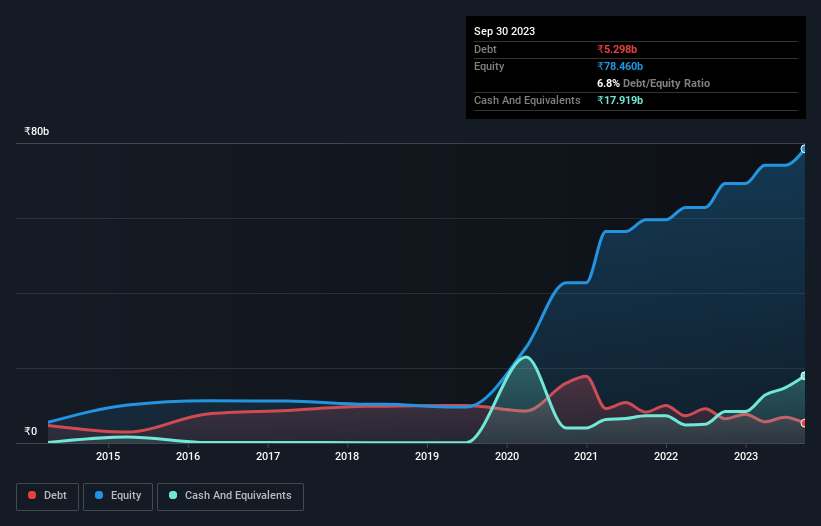- India
- /
- Healthcare Services
- /
- NSEI:MAXHEALTH
Max Healthcare Institute (NSE:MAXHEALTH) Seems To Use Debt Rather Sparingly

The external fund manager backed by Berkshire Hathaway's Charlie Munger, Li Lu, makes no bones about it when he says 'The biggest investment risk is not the volatility of prices, but whether you will suffer a permanent loss of capital.' It's only natural to consider a company's balance sheet when you examine how risky it is, since debt is often involved when a business collapses. Importantly, Max Healthcare Institute Limited (NSE:MAXHEALTH) does carry debt. But the real question is whether this debt is making the company risky.
When Is Debt A Problem?
Debt assists a business until the business has trouble paying it off, either with new capital or with free cash flow. Ultimately, if the company can't fulfill its legal obligations to repay debt, shareholders could walk away with nothing. However, a more usual (but still expensive) situation is where a company must dilute shareholders at a cheap share price simply to get debt under control. By replacing dilution, though, debt can be an extremely good tool for businesses that need capital to invest in growth at high rates of return. The first thing to do when considering how much debt a business uses is to look at its cash and debt together.
Check out our latest analysis for Max Healthcare Institute
What Is Max Healthcare Institute's Net Debt?
As you can see below, Max Healthcare Institute had ₹5.30b of debt at September 2023, down from ₹6.47b a year prior. However, it does have ₹17.9b in cash offsetting this, leading to net cash of ₹12.6b.

A Look At Max Healthcare Institute's Liabilities
Zooming in on the latest balance sheet data, we can see that Max Healthcare Institute had liabilities of ₹11.3b due within 12 months and liabilities of ₹16.8b due beyond that. Offsetting this, it had ₹17.9b in cash and ₹4.30b in receivables that were due within 12 months. So its liabilities total ₹5.88b more than the combination of its cash and short-term receivables.
This state of affairs indicates that Max Healthcare Institute's balance sheet looks quite solid, as its total liabilities are just about equal to its liquid assets. So it's very unlikely that the ₹694.2b company is short on cash, but still worth keeping an eye on the balance sheet. Despite its noteworthy liabilities, Max Healthcare Institute boasts net cash, so it's fair to say it does not have a heavy debt load!
In addition to that, we're happy to report that Max Healthcare Institute has boosted its EBIT by 38%, thus reducing the spectre of future debt repayments. The balance sheet is clearly the area to focus on when you are analysing debt. But ultimately the future profitability of the business will decide if Max Healthcare Institute can strengthen its balance sheet over time. So if you're focused on the future you can check out this free report showing analyst profit forecasts.
Finally, a business needs free cash flow to pay off debt; accounting profits just don't cut it. While Max Healthcare Institute has net cash on its balance sheet, it's still worth taking a look at its ability to convert earnings before interest and tax (EBIT) to free cash flow, to help us understand how quickly it is building (or eroding) that cash balance. In the last three years, Max Healthcare Institute's free cash flow amounted to 47% of its EBIT, less than we'd expect. That weak cash conversion makes it more difficult to handle indebtedness.
Summing Up
We could understand if investors are concerned about Max Healthcare Institute's liabilities, but we can be reassured by the fact it has has net cash of ₹12.6b. And it impressed us with its EBIT growth of 38% over the last year. So we don't think Max Healthcare Institute's use of debt is risky. Above most other metrics, we think its important to track how fast earnings per share is growing, if at all. If you've also come to that realization, you're in luck, because today you can view this interactive graph of Max Healthcare Institute's earnings per share history for free.
If, after all that, you're more interested in a fast growing company with a rock-solid balance sheet, then check out our list of net cash growth stocks without delay.
New: Manage All Your Stock Portfolios in One Place
We've created the ultimate portfolio companion for stock investors, and it's free.
• Connect an unlimited number of Portfolios and see your total in one currency
• Be alerted to new Warning Signs or Risks via email or mobile
• Track the Fair Value of your stocks
Have feedback on this article? Concerned about the content? Get in touch with us directly. Alternatively, email editorial-team (at) simplywallst.com.
This article by Simply Wall St is general in nature. We provide commentary based on historical data and analyst forecasts only using an unbiased methodology and our articles are not intended to be financial advice. It does not constitute a recommendation to buy or sell any stock, and does not take account of your objectives, or your financial situation. We aim to bring you long-term focused analysis driven by fundamental data. Note that our analysis may not factor in the latest price-sensitive company announcements or qualitative material. Simply Wall St has no position in any stocks mentioned.
About NSEI:MAXHEALTH
Max Healthcare Institute
Provides medical and healthcare services in India.
High growth potential with excellent balance sheet.

